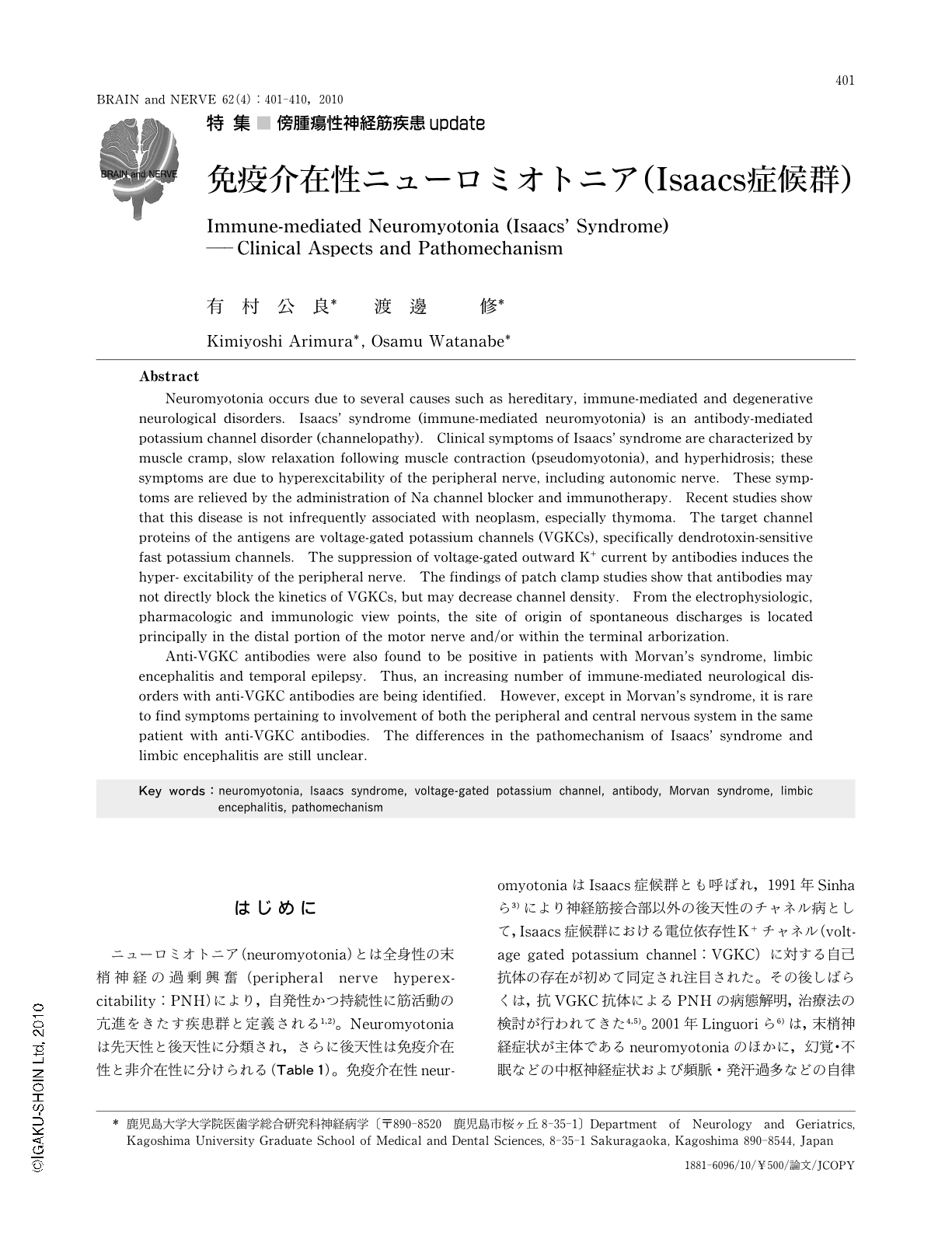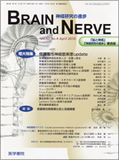Japanese
English
- 有料閲覧
- Abstract 文献概要
- 1ページ目 Look Inside
- 参考文献 Reference
はじめに
ニューロミオトニア(neuromyotonia)とは全身性の末梢神経の過剰興奮(peripheral nerve hyperexcitability:PNH)により,自発性かつ持続性に筋活動の亢進をきたす疾患群と定義される1,2)。Neuromyotoniaは先天性と後天性に分類され,さらに後天性は免疫介在性と非介在性に分けられる(Table1)。免疫介在性neuromyotoniaはIsaacs症候群とも呼ばれ,1991年Sinhaら3)により神経筋接合部以外の後天性のチャネル病として,Isaacs症候群における電位依存性K+チャネル(voltage gated potassium channel:VGKC)に対する自己抗体の存在が初めて同定され注目された。その後しばらくは,抗VGKC抗体によるPNHの病態解明,治療法の検討が行われてきた4,5)。2001年Linguoriら6)は,末梢神経症状が主体であるneuromyotoniaのほかに,幻覚・不眠などの中枢神経症状および頻脈・発汗過多などの自律神経症状を呈し,従来Morvan症候群として報告されてきた患者の中に,抗VGKC抗体が陽性である症例が存在することを初めて報告し,抗VGKC抗体の中枢神経疾患への関与が注目された。さらにneuromyotoniaなどの末梢神経症状を伴わず,中枢神経症状のみを示す辺縁系脳炎の一部に抗VGKC抗体が関与することが明らかとなり7),ここに抗VGKC抗体関連神経疾患という概念が確立した。現在でも抗VGKC抗体関連神経疾患の概念は広がっており,側頭葉てんかんの一部にも抗VGKC抗体が関与することが明らかになってきている8)(Fig.1)。このように抗VGKC抗体が末梢性,中枢性の神経疾患に関連することが明らかになっているが,VGKCそのものは全身の神経系に存在しているにもかかわらず,一部の症例を除いて,なぜ末梢のみあるいは中枢のみの症状を呈するのか,またVGKCの障害機序が末梢,中枢で同一なのかなど不明な点も少なくない。本稿ではIsaacs症候群を中心として,現在の抗VGKC関連神経疾患の概念,問題点について述べる。
Abstract
Neuromyotonia occurs due to several causes such as hereditary, immune-mediated and degenerative neurological disorders. Isaacs' syndrome (immune-mediated neuromyotonia) is an antibody-mediated potassium channel disorder (channelopathy). Clinical symptoms of Isaacs' syndrome are characterized by muscle cramp, slow relaxation following muscle contraction (pseudomyotonia), and hyperhidrosis; these symptoms are due to hyperexcitability of the peripheral nerve, including autonomic nerve. These symptoms are relieved by the administration of Na channel blocker and immunotherapy. Recent studies show that this disease is not infrequently associated with neoplasm, especially thymoma. The target channel proteins of the antigens are voltage-gated potassium channels (VGKCs), specifically dendrotoxin-sensitive fast potassium channels. The suppression of voltage-gated outward K+ current by antibodies induces the hyper- excitability of the peripheral nerve. The findings of patch clamp studies show that antibodies may not directly block the kinetics of VGKCs, but may decrease channel density. From the electrophysiologic, pharmacologic and immunologic view points, the site of origin of spontaneous discharges is located principally in the distal portion of the motor nerve and/or within the terminal arborization.
Anti-VGKC antibodies were also found to be positive in patients with Morvan's syndrome,limbic encephalitis and temporal epilepsy. Thus,an increasing number of immune-mediated neurological disorders with anti-VGKC antibodies are being identified. However,except in Morvan's syndrome,it is rare to find symptoms pertaining to involvement of both the peripheral and central nervous system in the same patient with anti-VGKC antibodies. The differences in the pathomechanism of Isaacs' syndrome and limbic encephalitis are still unclear.

Copyright © 2010, Igaku-Shoin Ltd. All rights reserved.


